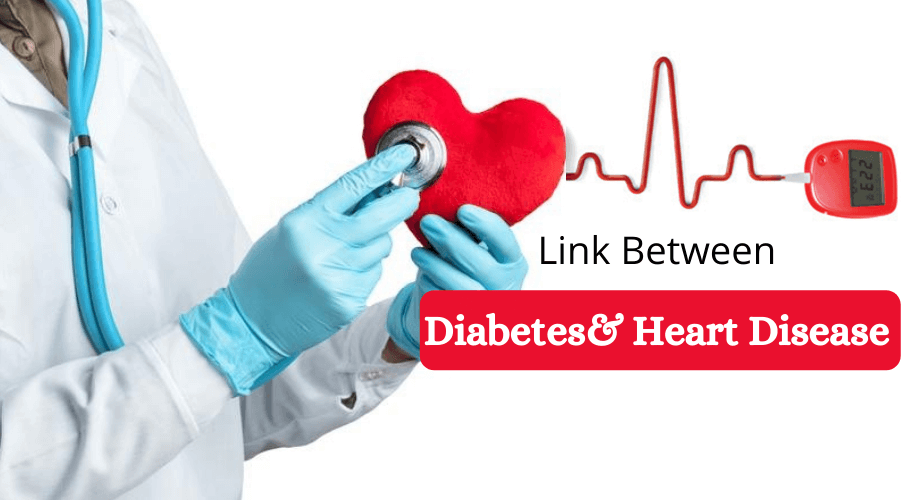What is the Link Between Diabetes and Cardiovascular Disease?

Diabetes inevitably brings heart disease. But with a few changes in your lifestyle, you can reduce the risk of cardiovascular problems, while also bringing your diabetes under control. Read on to find out more about diabetes’ effect on your heart, and how to manage both.
What is heart disease
Cardiovascular disease includes all disorders connected to the heart, i.e. stroke, blood vessel, and, the most common, coronary artery disease. Coronary artery disease is a result of plaque build-up on the walls of the arteries that supply oxygenated blood to the heart. This plaque, which is basically cholesterol, coats the arterial wells, effectively narrowing them and thus decreasing blood flow.
If this is not treated, there is a high risk of a heart attack. When plaque builds up on arteries supplying blood to the brain, it can cause a stroke. Plaque also affects other parts of the body, such as the upper and lower limbs. This is called peripheral arterial disease or PAD and is often the first symptom shown by diabetics suffering from cardiovascular disease.
How high blood sugar affects your heart
Another effect of high blood sugar is damage to blood vessels and nerves of your heart. This, coupled with the narrowing of arteries, causes high blood pressure. The combination of high BP and diabetes significantly increases the risk of heart disease
Other contributing factors are high LDL (aka, ‘bad’ cholesterol), which promotes the build-up of plaque on arterial walls, and high triglycerides and low HDL (aka ‘good’ cholesterol). The combination of high LDL and low HDL is thought to cause the hardening of arteries.
Neither high BP nor high cholesterol comes with any visible symptoms. So it is critical that diabetics regularly monitor their blood pressure and undergo regular blood tests to ensure their LDL, HDL, and triglycerides are in the normal range.
What is the most important risk factor for cardiovascular disease?
There are several habits that increase the risk of heart disease. Whether or not you’re diabetic, it is a good idea to observe the following Do’s and Dont’s:
- Stop smoking
- Ensure weight is in the normal range
- Avoid high-fat diets
- Don’t over-salt your food
- Moderate or avoid alcohol consumption
What are the Testing & Treatment for cardiovascular disease?
In addition to BP and blood tests, there are several clinical tests that your doctor might prescribe to understand your situation and assess your risk for heart disease, these tests include:
1. Electrocardiogram (ECG)

Electrocardiogram (ECG). This is a simple painless test that measures the electrical impulse of your heart—since the heartbeat is caused by the electrical impulse, this test tells the doctor if your heart is not beating properly.
2. Echocardiogram

Echocardiogram Also known simply as echo, the echocardiogram measures the thickness of your heart muscle and checks the efficiency of your heart’s pumping action.
3. Stress Test

Stress Test is the clinician will hook you up with sensors that measure your heart rate (as well as pulse) to determine how efficiently your heart functions when you are physically active.
6 Ways to Keep Your Heart Healthy
You don’t have to wait for symptoms to show up. You can pre-empt health issues with a few lifestyle changes to lower the risk of heart disease and/or keep it from worsening. These lifestyle changes will also help you bring your diabetes under control.
1. Adopt a healthy diet
This means increasing intake of fresh, low-to-mid glycemic fruits, green vegetables, legumes, pulses, whole grains, and lean protein. Cut out processed foods, foods that contain trans fats, sugary drinks, alcohol, and milk—it is by far the biggest offender of all diet villains—read our post here to understand the risks of consuming milk
2. Stay hydrated
The average adult needs to drink at least 2 liters of water to ensure smooth bodily functions. Diabetics especially need to drink enough water, as the body flushes out excess glucose through urine (ergo, the insatiably thirst and urination that diabetics experience), and this loss of water needs to be balanced.
3. Maintain a healthy weight
Obesity is a big cause of insulin resistance. Dropping even a few kilograms can have an immediate salary effect, not just on your cholesterol,hypertension (BP), and blood sugar, but also on your self-esteem.
4. Stay physically active
Physical activity—better yet, planned exercise—forces your body to use up stored glycogen and enhances insulin sensitivity. Try to get in 45 minutes to an hour of daily exercise at least five days a week.
The best exercises you can do are anti-gravity exercises, of which the easiest is stair-climbing. Even five minutes of stair climbing can bring blood sugar counts by 30, 40, and even 70 points. To understand the effect of anti-gravity exercises on your blood sugar, read our post on the same topic, here.
5. Actively reduce stress
Stress is one of the biggest and most underestimated dangers to health. It can raise BP, worsen blood sugar levels, and trigger unhealthy habits like stress-eating or drinking, or drug abuse.
Speak of a counselor if you feel stressed in any area of your life. Meditation, Yoga, simple deep breathing, and regular exercise, coupled with a strong social network can help dissipate stress effectively.
6. Follow the A-B-C approach
- Get the A1C test—it tells you your average blood sugar over the past 3 months
- Bring your Blood Pressure in the normal range
- Reduce your Cholesterol levels to bring them in the normal range
Diabetes brings a host of health complications, of which heart disease is one of the most dangerous. But with a few changes in lifestyle and regular monitoring through health checks, diabetics can reduce or altogether avoid the risk of contracting heart problems.
Disclaimer:
This Blog solely serves our marketing purposes, for Authentic knowledge for this topic, Please join our upcoming Discover Reversal Session

